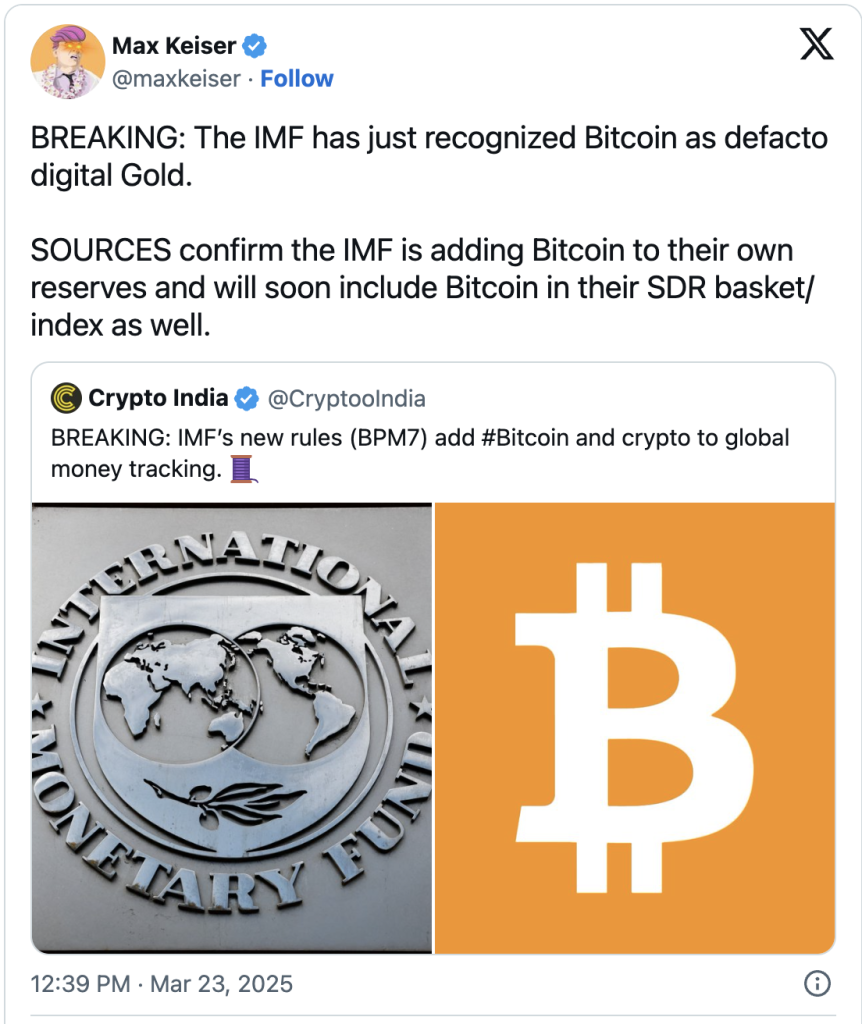- IMF established a common method for cryptocurrency transactions to improve digital asset movement transparency.
- Bitcoin is classified like land and resources, while Tether is a financial instrument.
- The IMF studies crypto held by nations, but El Salvador keeps buying Bitcoin.
The global financial regulatory organizations enforce businesses to use a common reporting system for cryptocurrency transactions. A standardized system exists for border nations to use in tracing digital asset movements.
Through the Balance of Payments Manual seventh edition issued by the International Monetary Fund the global tracking system for Bitcoin alongside all virtual currencies has become possible. The initiative creates enhanced trust in the global crypto economy.
According to the International Monetary Fund, 160 different countries collaborated to build this new platform to fix current problems related to digital asset tracking. The millions of trillions worth of cryptocurrencies remain a significant concern for governmental monitoring entities due to insufficient reporting protocols.
Reclassifying Digital Assets
Cryptocurrency standards under these updates now use organized classifications for information classification. Bitcoin exists within an updated classification framework that lists it together with other non-producing entities that include land and natural resources apart from financial services.
Recording stablecoins like Tether belong to the financial tool classification while crypto mining coupled with staking functions as computer services provided for export use.
Leading nations throughout the world have set preliminary procedures to control and direct cryptocurrency operations. American legal procedures led to the establishment of a Bitcoin investment fund that contains 200,000 Bitcoins. President Donald Trump issued orders that prohibited all additional cryptocurrency acquisitions in the United States.
The world maintains a stronger focus on both the financial reporting of cryptocurrency and the enhanced oversight of money transfer operations.
El Salvador Supports Bitcoin
In December 2024, El Salvador strengthened its support for using Bitcoin while it executed a contract with the $1.4 billion IMF agreement. At present, El Salvador holds 6,125 Bitcoins whose total worth amounts to $538 million. The IMF deal mandates the nation to create digital asset trading process regulations.
Cryptoassets are tracked by the IMF using identical essential financial information which IMF uses to evaluate large foreign asset transfers of land or spectrum licenses. Digital asset tracking will now be easier to access through the newly implemented system.
Diverse Reactions from the Crypto Community
The worldwide public holds unique perspectives regarding the IMF’s new management strategy. Several people endorse the guidelines because they recognize Bitcoin’s financial capabilities, but many others believe they only demonstrate recognition. Max Keiser, an advisor specializing in Bitcoin explains that while the International Monetary Fund associates Bitcoin with digital gold, it has not established Bitcoin as a digital gold asset formally.

That new reporting system will deliver greatest value to states which possess large numbers of Bitcoin users. KuCoin released research in 2023 which demonstrated that cryptocurrencies are used by 35% of Nigerian adults while other digital assets become increasingly important for emerging markets.
The IMF accepts cryptocurrencies as dominant economic entities across the globe yet they remain outside full legal parameters. Banks together with government authorities maintain improved authority over international cryptocurrency transactions through standard reporting procedures.
International monetary institutions now recognize cryptocurrencies through their updated guidance, which shows growing worldwide acceptance of their position in financial development.